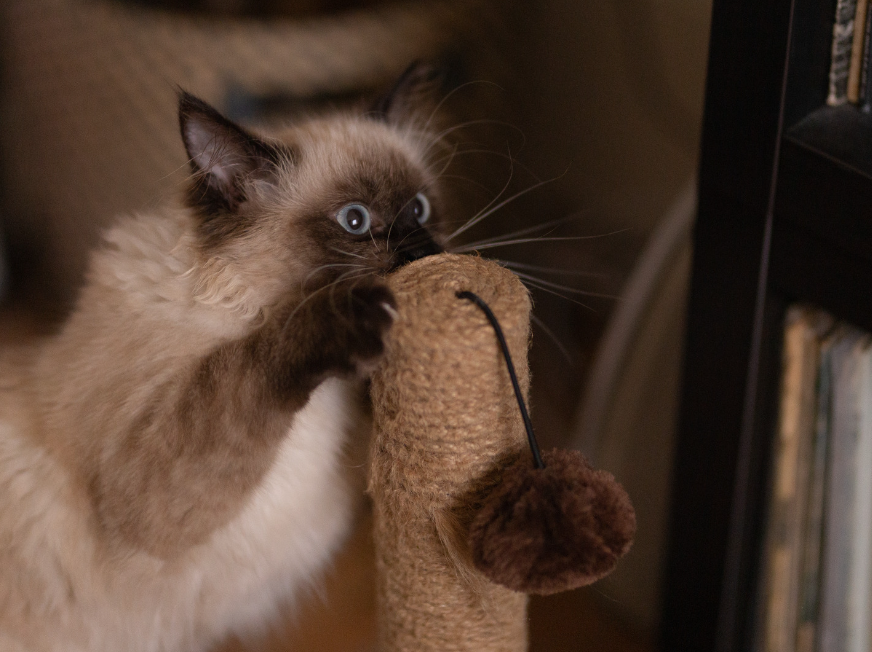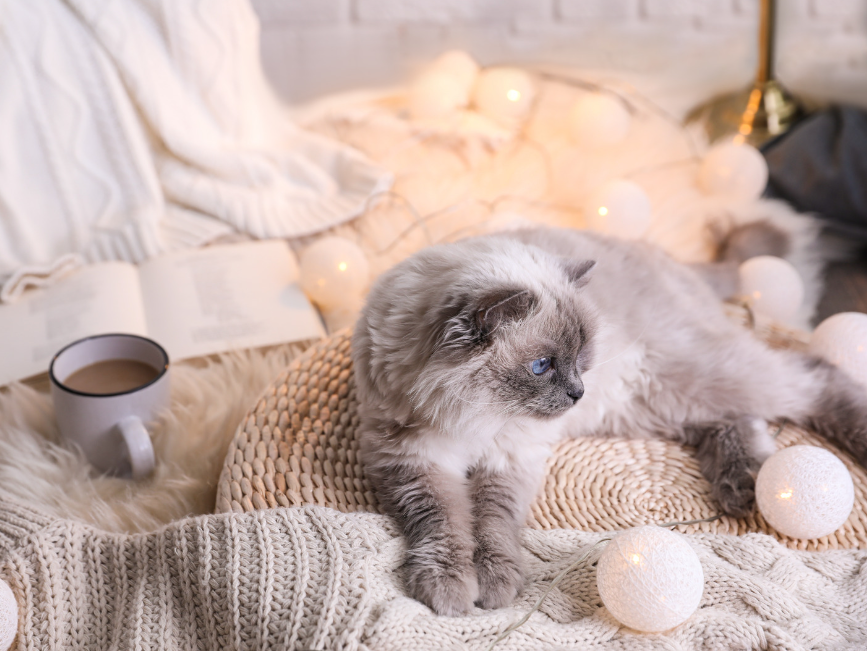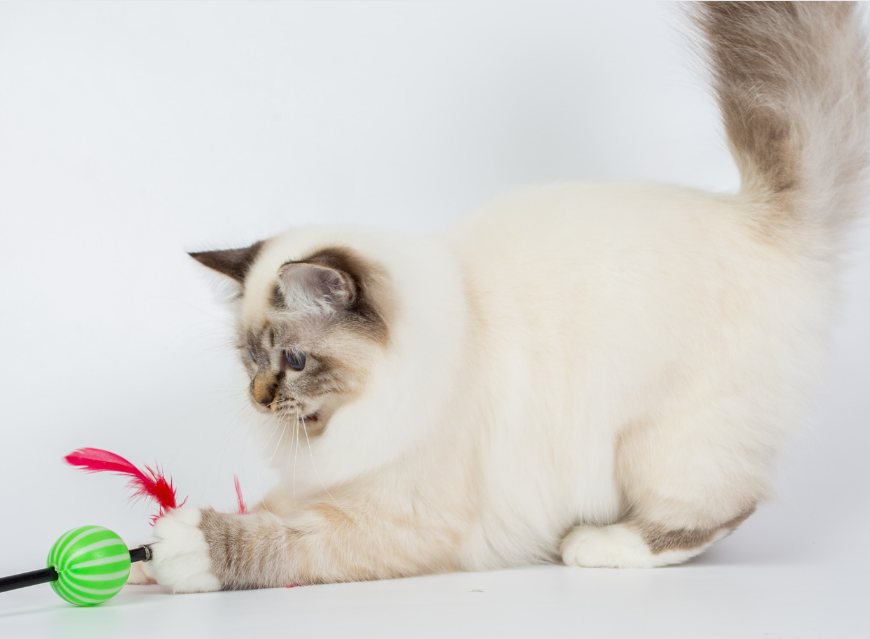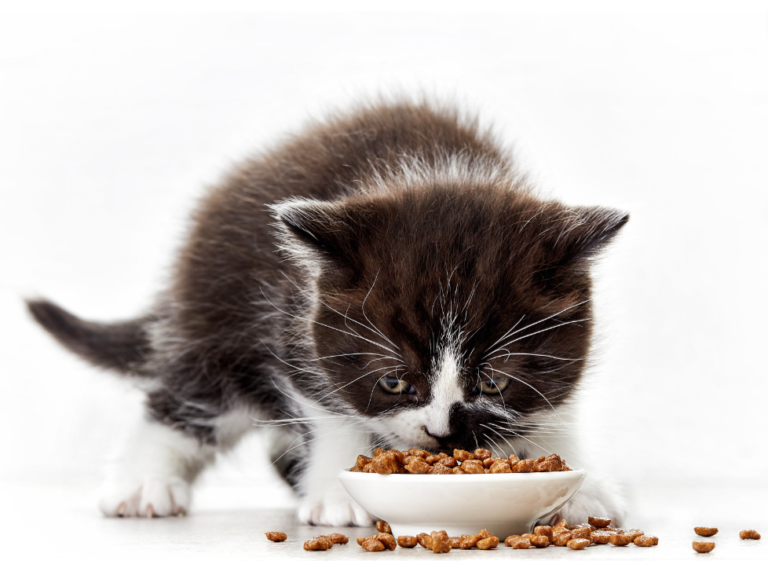1. The Ideal Indoor Companion: Birman Indoor Cats
Birman cats are often regarded as ideal indoor companions due to their friendly and affectionate nature, which makes them thrive in indoor environments. These cats are not only beautiful but also incredibly sociable, often forming close connections with their human family members. Birmans are known for following their owners around the house, seeking attention, and enjoying interactive play. Their need for companionship makes them well-suited to indoor living, where they can always be near their loved ones.
Birman Cats Indoors: Why They Adapt Well to Indoor Living
Birman cats adapt exceptionally well to indoor living because they are naturally calm and content in controlled environments. Unlike some other breeds that may feel confined, Birmans are perfectly happy to spend their days lounging in sunny spots, playing with toys, or snuggling up with their owners. Their low-maintenance lifestyle means they don’t require the extensive outdoor exercise that some other breeds do, making them the perfect choice for indoor-only households.
2. Birman Cat Behavior: Gentle and Playful
Birman cats are renowned for their unique blend of gentleness and playfulness, making them ideal companions for various household environments. Their temperament is often described as balanced, as they combine the best qualities of affectionate lap cats with the curiosity and energy of more active breeds.

The Gentle Side of Birman Cats
One of the standout features of Birman cats is their gentle nature. They are known to be very patient and are rarely aggressive, making them suitable for households with children or other pets. Birmans are not the type of cat that will lash out or act unpredictably. Instead, they approach life with a calm demeanor, preferring to observe their surroundings and interact with people in a loving, measured way. This gentleness is particularly evident in female Birman cats, who often display nurturing behaviors, making them seem almost maternal towards other animals and even small children.
Playfulness Without the Chaos
Despite their calm and gentle nature, Birman cats are also playful, but in a controlled and manageable way. They enjoy interactive toys, puzzles, and games that challenge their minds and allow them to express their natural hunting instincts. Unlike some high-energy breeds that can be overwhelming with their need for constant stimulation, Birmans balance their playfulness with periods of relaxation. This makes them perfect for owners who want a cat that enjoys playtime but also knows when to wind down and cuddle.
Interaction with Other Pets and People
Birman cats are incredibly social and thrive on interaction, whether it’s with other pets, people, or even visitors. They are known to be particularly good at reading the room and adjusting their behavior based on the energy and mood of those around them. This adaptability makes them a favorite among families and individuals alike, as they can be both a playful companion and a calming presence when needed.
3. Indoor Pet Benefits: Why Birmans Excel Indoors
Keeping a Birman cat as an indoor pet comes with numerous benefits that contribute to their overall well-being and happiness. These benefits not only enhance the quality of life for the cat but also provide peace of mind for the owner.
Safety and Health Considerations
One of the most significant benefits of keeping a Birman cat indoors is the enhanced safety it offers. Outdoor environments can be unpredictable and dangerous for cats, exposing them to risks such as traffic, predators, and diseases. By keeping your Birman indoors, you can protect them from these dangers, ensuring they live a long and healthy life. Indoor cats are also less likely to contract diseases from other animals, such as feline leukemia or FIV, which are more prevalent in outdoor cats.

Controlled Environment for Optimal Health
Indoor living allows you to create a controlled environment tailored to your Birman’s needs. You can regulate their diet, exercise, and social interactions, ensuring they receive the right balance of nutrients, physical activity, and mental stimulation. This controlled environment helps prevent obesity, a common issue in cats that are not monitored closely. With the right care, an indoor Birman can maintain a healthy weight and avoid many of the health problems that can arise from an uncontrolled outdoor lifestyle.
Enhanced Bonding and Socialization
Another key benefit of indoor living for Birman cats is the opportunity for enhanced bonding with their owners. Because they spend more time indoors, they naturally interact more with the people around them, leading to stronger bonds and a deeper sense of companionship. This constant interaction also helps with socialization, making Birmans more comfortable and well-adjusted in a variety of situations, whether it’s meeting new people or adapting to changes in their environment.
4. Birman Cat Care: Maintaining a Happy and Healthy Indoor Life
Proper care is crucial for ensuring that your Birman cat enjoys a happy and healthy life indoors. This involves more than just providing food and shelter; it requires attention to their physical, emotional, and mental needs.
Grooming Essentials
Birman cats have a luxurious, silky coat that, while beautiful, requires regular grooming to keep it in top condition. Unlike some long-haired breeds, Birmans do not have an undercoat, which makes grooming a bit easier as they are less prone to matting. However, regular brushing—at least a few times a week—is still necessary to remove loose hair, prevent tangles, and reduce shedding. This grooming routine not only keeps their coat looking shiny and healthy but also provides an opportunity for bonding between you and your cat.
Diet and Nutrition
Feeding your Birman cat a balanced diet is essential for their overall health. As indoor cats, they are less active than their outdoor counterparts, so it’s important to provide them with food that meets their nutritional needs without contributing to weight gain. High-quality cat food that is rich in protein and low in fillers is ideal. Additionally, portion control is important to prevent obesity, which can lead to other health issues such as diabetes or joint problems. Always provide fresh water and consider incorporating wet food into their diet to increase hydration.
Mental and Physical Stimulation
Keeping your Birman mentally and physically stimulated is key to their well-being. Even though they are indoor cats, Birmans still have a natural curiosity and need for play. Providing a variety of toys, scratching posts, and climbing trees can help satisfy these instincts. Interactive play sessions with toys that mimic prey can keep them engaged and provide the exercise they need. Puzzle toys or treat-dispensing toys are also great for mental stimulation, helping to keep their minds sharp and preventing boredom.

Routine Veterinary Care
Regular veterinary check-ups are essential for maintaining your Birman’s health. These visits allow your vet to monitor your cat’s weight, dental health, and overall condition, catching any potential health issues early on. Vaccinations, flea control, and regular deworming are also important aspects of preventive care for indoor cats. By staying on top of their health needs, you can ensure that your Birman enjoys a long, healthy, and happy life indoors.
5. Birman Colors: The Beauty of Indoor Birmans
One of the most captivating aspects of Birman cats is their stunning coat colors, which are often highlighted even more when they are kept indoors. These colors not only add to their beauty but also play a significant role in their appeal as one of the most elegant cat breeds.
Understanding Birman Color Variations
Birman cats come in several color variations, each more striking than the last. The most common colors include seal, blue, chocolate, and lilac, all of which are accentuated by the breed’s signature “gloves”—white paws that contrast beautifully with their darker points. Seal point Birmans, with their deep brown markings and creamy body, are perhaps the most well-known, but the blue point variation, with its cool gray-blue tones, is equally stunning. Chocolate and lilac points offer warmer, softer alternatives, with the chocolate points displaying rich, warm browns and the lilac points showing off delicate pastel hues.
Caring for Their Unique Coat
The beauty of a Birman’s coat is not just in its color but also in its texture. The silky, medium-long fur requires regular grooming to keep it in top condition, especially since their indoor lifestyle means they may not shed as much naturally as outdoor cats. Regular brushing helps to remove loose hairs, prevent tangles, and keep their coat looking their best. Additionally, keeping them indoors helps maintain the vibrancy of their colors, as they are less exposed to the elements that can sometimes dull a cat’s fur.
Enhancing Their Natural Beauty Indoors
Indoor living allows Birman cats to retain their pristine appearance, as they are less likely to get their fur dirty or matted compared to outdoor cats. This controlled environment, combined with proper grooming and care, ensures that their beautiful colors remain vibrant throughout their life. The contrast of their dark points against their lighter body fur, paired with their sparkling blue eyes, makes them a truly striking presence in any home.
6. Are Birman Cats Good with Dogs? A Harmonious Household
Birman cats are known for their friendly and adaptable nature, which often makes them a good fit for households with dogs. Their sociable personality allows them to get along well with canine companions, creating a harmonious household dynamic.

Birman Cats and Dogs: Building a Peaceful Coexistence
Birman cats are generally known for their patience and tolerance, qualities that serve them well when living with dogs. Unlike some more territorial cat breeds, Birmans are usually open to sharing their space with a dog, provided that the introduction is handled carefully. It’s important to introduce a Birman cat to a dog gradually, allowing them to become accustomed to each other’s presence without feeling threatened. Start by letting them sniff each other’s belongings, such as bedding or toys, before arranging supervised face-to-face meetings.
The Birman’s Role in a Multi-Pet Household
In a multi-pet household, the Birman cat often takes on the role of a peacekeeper. Their calm and non-aggressive nature means they are unlikely to provoke conflict with a dog, and instead, they tend to be more curious and cautious. Over time, many Birmans form strong bonds with dogs, often engaging in playful behavior or even cuddling together. This ability to coexist peacefully with dogs makes Birmans an excellent choice for families who already have a canine member.
Training and Socialization for a Smooth Relationship
To ensure a smooth relationship between a Birman cat and a dog, it’s essential to focus on training and socialization. Teaching the dog basic commands, such as “sit,” “stay,” and “leave it,” can help prevent any rough or overly enthusiastic behavior that might scare or annoy the cat. Similarly, reinforcing positive interactions between the two pets with treats and praise can help them associate each other’s presence with good experiences. With time, patience, and the right approach, a Birman cat and a dog can become the best of friends, providing endless joy and companionship to their owners.
7. Birman Cat Pros and Cons: Weighing the Indoor Lifestyle
Like any pet, Birman cats come with their own set of pros and cons, especially when considering an indoor lifestyle. Understanding these aspects can help potential owners make an informed decision about whether a Birman is the right fit for their home.
Pros of Keeping a Birman Cat Indoors
One of the most significant advantages of keeping a Birman cat indoors is their gentle and affectionate nature. They are known to form strong bonds with their owners, often following them around the house and seeking out attention. Their low-maintenance grooming needs, thanks to their lack of an undercoat, make them easier to care for compared to some other long-haired breeds. Additionally, Birmans are relatively quiet cats, making them suitable for apartment living or homes where noise might be an issue.
Another pro is their adaptability. Birman cats tend to adjust well to indoor living, as long as they are provided with enough mental and physical stimulation. They enjoy the comfort and safety of an indoor environment, which can help reduce stress and prolong their lifespan. Their playful yet not overly energetic nature also means they don’t require as much space to be happy, making them ideal for smaller living spaces.
Cons of the Indoor Lifestyle for Birmans
However, there are some cons to consider. Birmans, like all cats, can become bored if not given enough attention or stimulation. An unstimulated Birman may develop behavioral issues, such as scratching furniture or becoming overly vocal. While they are generally low-maintenance, their sociable nature means they do require regular interaction and companionship. Owners who are away from home for long periods might find that a Birman becomes lonely or depressed without adequate engagement.
Another consideration is their predisposition to certain health issues, such as obesity, if they are not given enough exercise. Because they are less active indoors, it’s crucial to monitor their diet and provide regular playtime to keep them fit and healthy.

Conclusion: Is the Indoor Lifestyle Right for Your Birman?
Ultimately, the decision to keep a Birman cat indoors depends on the owner’s lifestyle and ability to meet their needs. While they thrive in indoor environments, it’s essential to provide them with the right care, attention, and stimulation to ensure they remain happy and healthy. By weighing the pros and cons, potential owners can determine if the Birman cat is the right fit for their home and lifestyle.
8. Birman Cat Price: The Investment of a Lifelong Friend
When considering a Birman cat, the price is an important factor, as these cats are not only beautiful but also a long-term investment in a loving companion. Birman cats can be on the higher end of the price spectrum, reflecting their pedigree, health, and the care taken by reputable breeders.
Indoor Cat Breeds: Why Birmans Are Worth the Price
Despite their cost, Birmans are worth the investment for those seeking a loyal, affectionate, and low-maintenance indoor pet. Their gentle nature and striking appearance make them one of the most sought-after indoor cat breeds, offering years of companionship and joy to their owners.
9. Fun Facts About Birman Cats: Unique Traits and Quirks
Birman cats are full of unique traits and quirks that make them even more endearing as indoor pets. For instance, did you know that Birmans are often referred to as the “Sacred Cat of Burma”? This breed is surrounded by legends, including one that suggests they were once temple cats in Burma, now Myanmar.
Birman Indoor Cats: Lesser-Known Facts
Another fun fact about Birman indoor cats is their striking blue eyes, which are a hallmark of the breed. Additionally, Birmans are known for their vocal yet soft-spoken nature; they will often “talk” to their owners with gentle meows, making their presence known subtly and endearingly.
10. Birman Cat Behavior: What Makes Them the Best Indoor Cats
The behavior of Birman cats sets them apart as one of the best indoor cats, known for their calm yet engaging personalities. Birmans are affectionate, loyal, and intelligent, often learning to follow commands and even play fetch. Their adaptable nature makes them well-suited to a variety of living situations, from small apartments to large homes.

Birman Cats Indoors: Why They Are Perfect for an Indoor Lifestyle
Birman cats excel in an indoor lifestyle because they are content with the comforts of home and thrive on interaction with their human companions. Their love of routine and their gentle nature make them easy to live with, while their playful side ensures that they remain active and entertained indoors. For those seeking a loving and low-maintenance indoor pet, Birman cats are the perfect choice.
Final Thoughts: Why Birman Cats Are the Perfect Indoor Companions
Birman cats are undeniably one of the best choices for an indoor pet, offering a perfect blend of beauty, personality, and companionship. Their gentle nature, striking appearance, and adaptability make them a wonderful addition to any home. Whether you’re a seasoned cat owner or new to the world of feline companionship, a Birman cat will bring joy and warmth to your life.
FAQ Section
Do Birman Cats Shed?
Yes, Birman cats do shed, but regular grooming can help manage shedding and keep their coat healthy.
Are Birman Cats Good with Children?
Absolutely! Birman cats are known for their gentle and patient nature, making them excellent companions for children. read more
How Much Exercise Do Birman Cats Need?
Birman cats are relatively low-maintenance when it comes to exercise. Interactive play sessions and access to toys are usually sufficient to keep them happy and healthy.
Do Birman Cats Require Special Care?
While Birmans are generally low-maintenance, they do require regular grooming to maintain their silky coat and prevent matting. read more
What Is the Average Lifespan of a Birman Cat?
Birman cats typically live between 12 to 16 years, with some even reaching their early 20s with proper care.




